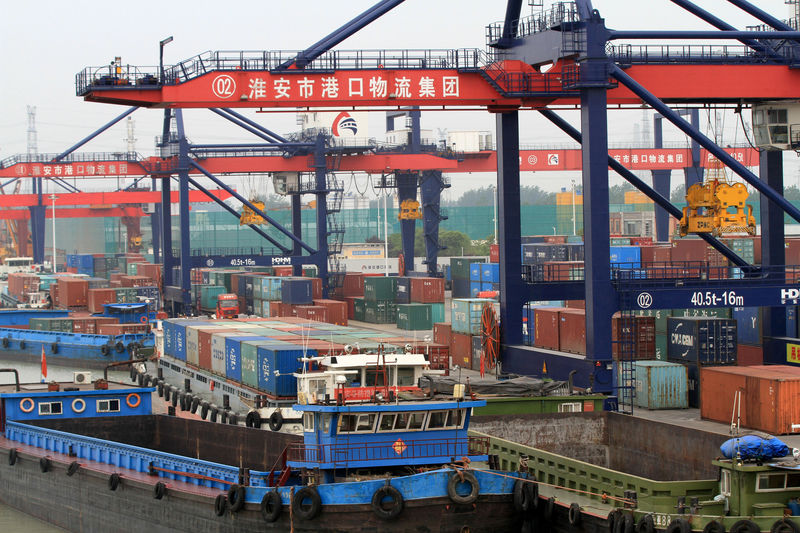(Reuters) - CROUCHING DRAGON
There's plenty of life left in the Chinese dragon, but after roaring for three decades it's certainly lost some of its puff. Markets are primed for exports from the world's second largest economy to show weakness and for investment and lending data to show Beijing's stimulus efforts in the face of a trade war with Washington are bearing some fruit.
Indeed, investors are looking past these figures for May. PBOC boss Yi Gang has already signalled his readiness for more stimulus and focus is firmly on whether Presidents Xi Jinping and Donald Trump can negotiate some kind of detente when they meet at the end-June G20 summit.
The conflict has in fact moved on from mere trade: Blacklists on companies, rare earths supply threats and China advising citizens to avoid U.S. travel, Washington's criticism of Chinese human rights practices - little seems off limits.
The International Monetary Fund already expects Chinese growth to slow to 6.2% this year and to 6% in 2020. That would be the weakest since 1990, but analysts believe real growth has already dipped below those levels. Weak data in coming days would merely confirm the grim outlook for the world economy.
China trade, GDP, lending: https://tmsnrt.rs/2WVitTM
WATERING SHOOTS OF INFLATION
The Fed's latest catchphrase -- "average inflation targeting" -- will get some play when the U.S. Labor Department releases May producer and consumer price indexes.
On Tuesday PPI, a measure of pipeline inflation heavily influenced by raw material costs, is seen rising 2.0% year-on-year. The core measure, which strips out food and energy prices, is forecast at 2.3%.
But the Fed and investors will pay more attention to Wednesday's CPI print, measuring the pocketbook impact. Headline and core are seen rising 1.9% and 2.1% respectively.
The concern is that CPI will mirror the Fed's favorite inflation measure, the core Personal Consumption Expenditures index. That rose 1.6% in the year to April and has consistently run below the official 2% target.
So, frustrated policymakers are floating once unspeakable notions. If they try to get inflation to average 2% over time, instead of ranging symmetrically on either side of it, interest rates could be cut sooner rather than later. A little extra inflation while the economy is strong looks better than deflation, a consumption-stifling alternative that would limit policy options if the economy turns south. That's a full agenda for the June FOMC meeting the following week.
U.S. price, wage growth: https://tmsnrt.rs/2R05ECB
OIL: SLIPPING AND SLIDING
Oil prices, hyper-sensitive to any signs of weakness in the global economy, have finally started reacting to the trade war newsflow and the ominous signals bond markets are sending on the possibility of recession. Until end-May, oil prices were holding above $70 a barrel but recent dismal PMI readings may have tipped the balance, pushing Brent crude futures 12% lower in just three days.
With pricing sliding suddenly to five-month lows, analysts have been left wondering if demand for the black gold is weaker than earlier thought. Such heavy selling is pretty rare, particularly outside recessions.
A global recession this year is unlikely. But with trade waning - 2019 could turn out to be the worst year for global commerce flows in a decade - there are no compelling signs of economic improvement either.
Oil demand slows by several hundred thousand barrels per day during recessions, according to Morgan Stanley (NYSE:MS), which cut its Brent forecast for the second half of this year to $65-70 per barrel from $75-80.
Meanwhile, OPEC - the group which controls most of the world's oil output - is starkly divided. Members' latest spat is over the date of their next meeting.
Crude Trade and PMI chart June 7: https://tmsnrt.rs/2QTgCK3
TURKISH CONUNDRUM
Turkey's central bank will publish its interest rate decision on Wednesday. A few months ago, this meeting was meant to be the one at which policymakers were definitely going to start cutting rates, having successfully sailed through the rough waters of market turmoil sparked by political tensions.
Fast forward, and few of these issues have been put to bed. An election re-run in the country's biggest city, Istanbul, is scheduled for June 23. The rocky U.S.-Turkey relationship has soured again over defence issues and trade tensions and economic woes are clouding the global backdrop.
But Turkey's economy is undergoing a sharp adjustment following the lira's 30% tumble in 2018 and near 10% drop so far this year. Inflation, now at nearly 19%, has eased quicker than expected. No doubt the 24% interest benchmark rate will have to come down. But moving too early is seen by many as another policy mistake that Turkey's battered currency can ill afford.
Turkey interest rate and inflation: https://tmsnrt.rs/2QWXbjl
MONETARY MEDDLING
From the United States to India, central banks have come under heavy political pressure. U.S. President Donald Trump has frequently lambasted policy decisions of Federal Reserve chairman Jerome Powell, while Turkey's Tayyip Erdogan calls regularly for lower borrowing costs. Public rows have broken out in India over the central bank's independence.
Now the South African Reserve Bank is feeling the heat. Some members of the governing African National Congress party are pushing for its mandate to widen beyond its current remit of inflation-targeting to promote jobs and economic growth.
That is another worry for foreign investors on top of the past week's shock GDP reading, showing a deeper-than-expected contraction in the first three months of 2019.
Many see the risk of painful parallels with Turkey, where the central bank, stymied by political interference, has resorted to unconventional policy tools to fight stubbornly high inflation. Unimpressed, many overseas investors have responded by pulling out.
That should serve as a reminder to South Africa's government: Tinkering with central banks in emerging markets rarely ends well.
South Africa unemployment level: https://tmsnrt.rs/2QTfKVA
